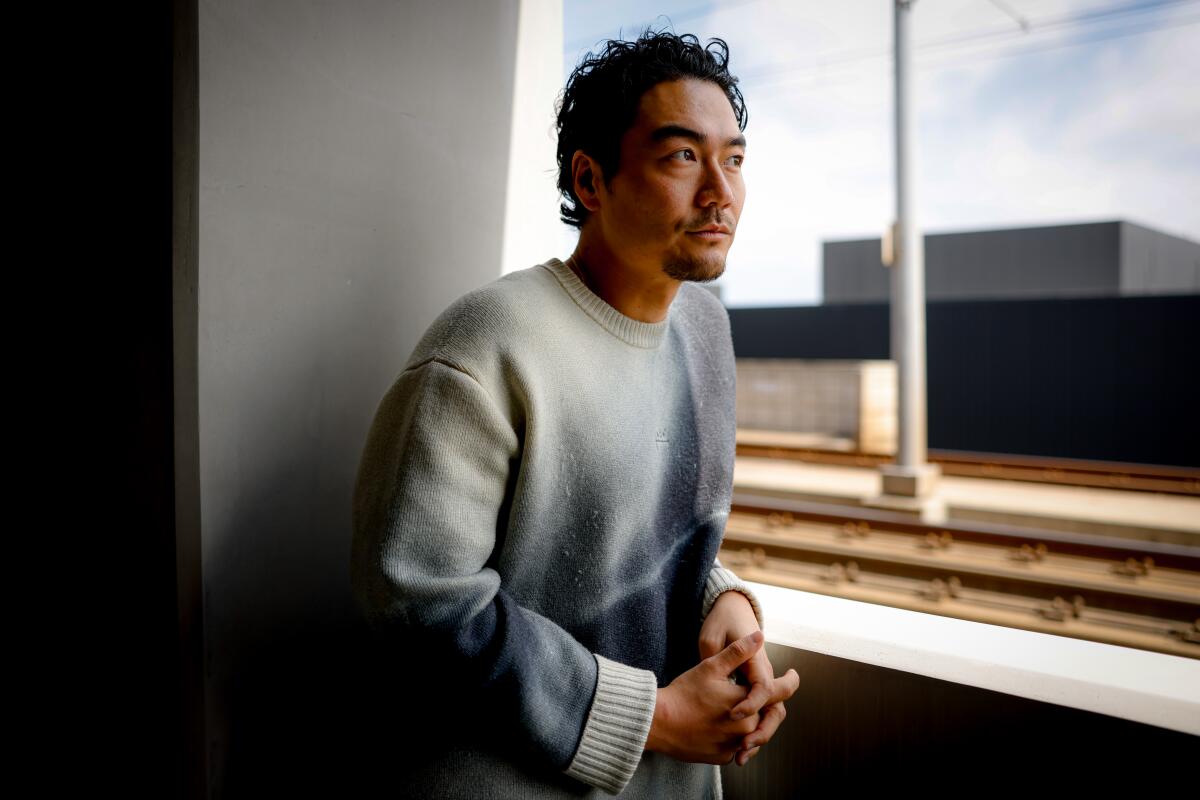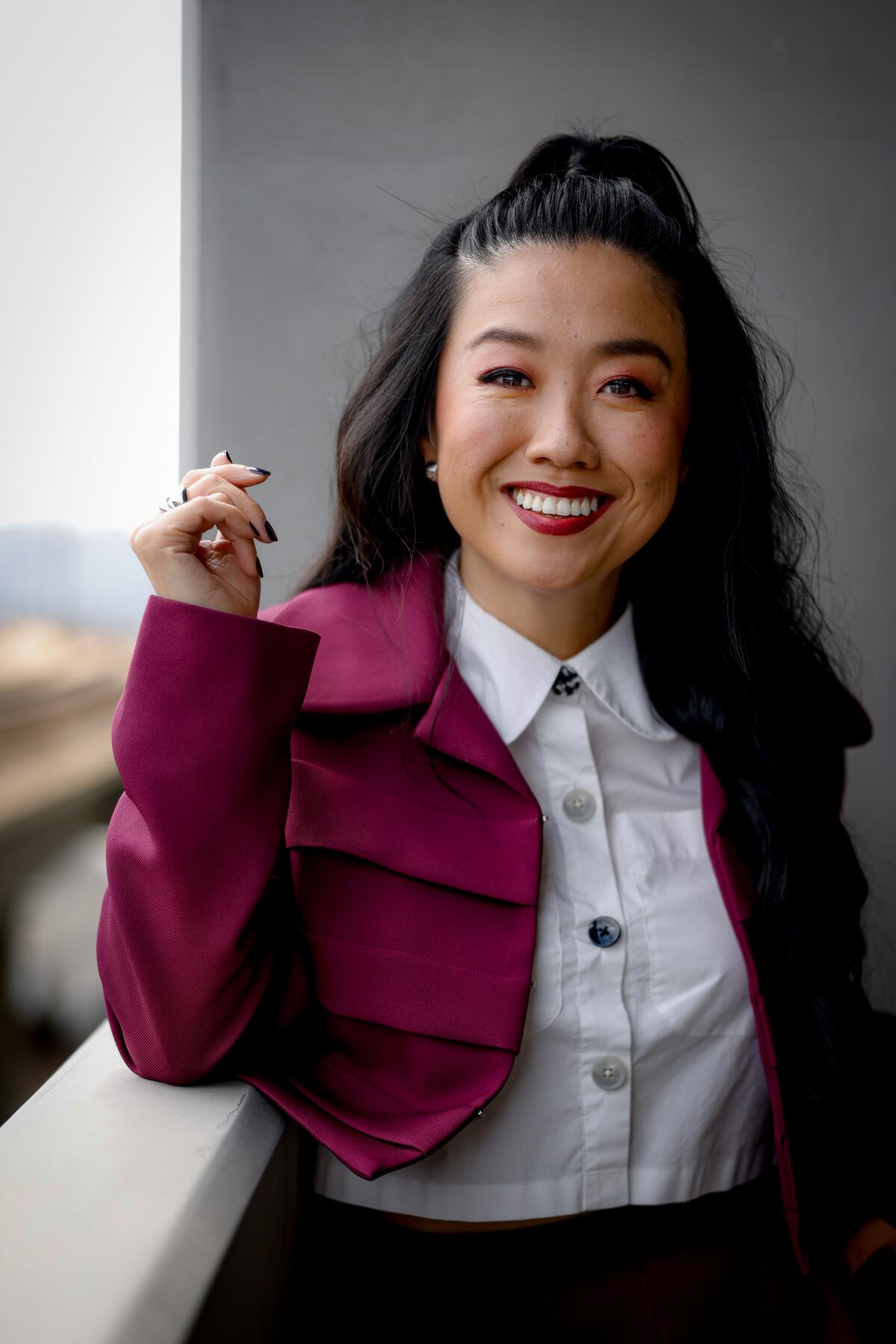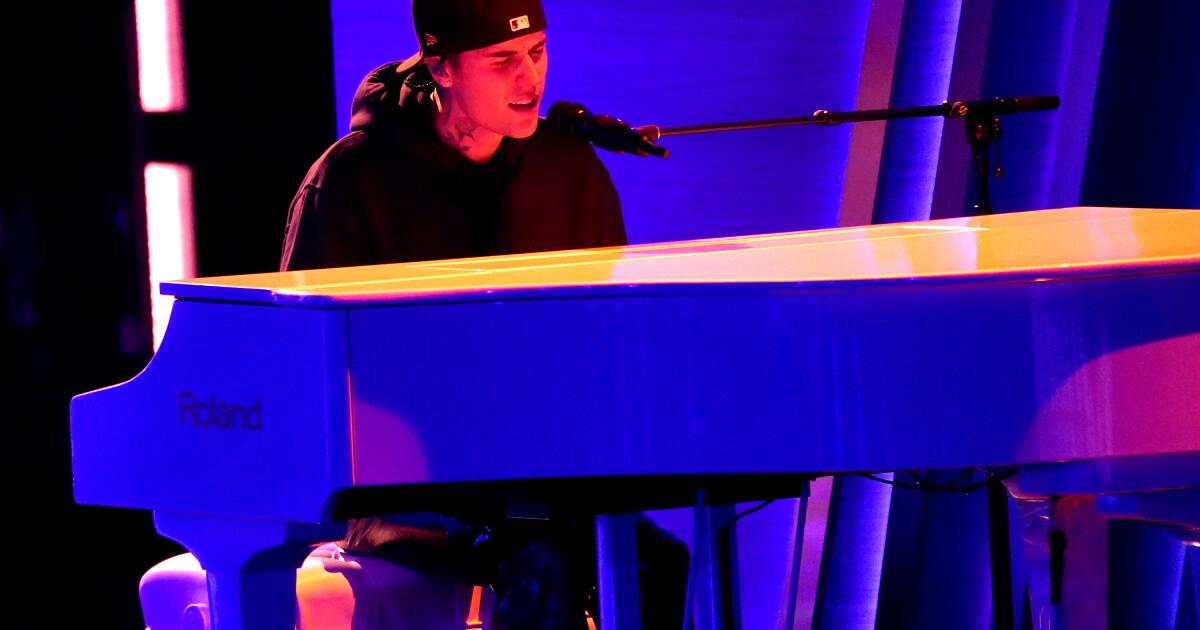Belly Laughs spotlights Asian comedians and cuisine at L.A. Live

“Never more than two.”
That’s Kumail Nanjiani’s general assessment of the modest serving of Asian performers on a typical comedy show lineup (if any at all) when he was starting out in comedy. Even as an actor who’s gone on to find success on hit TV shows like “Silicon Valley” and has flown high in the Marvel Cinematic Universe with “Eternals,” the stereotype of ethnic comedy quotas from his roots in stand-up — which he’s recently returned to a couple years ago — still sticks with him.
Nanjiani recently spoke with The Times about this weekend’s Belly Laughs Festival, a two-day event at L.A. Live that spotlights Asian comedians, cuisine and culture. He was joined by fellow festival performer Jonnie Park (a.k.a. rapper Dumbfoundead) and comedian/actor Sherry Cola (who is no longer performing at the festival due to a scheduling conflict) to talk about the importance of Asian representation in comedy.
During the chat, Nanjiani described not only his love for food (specifically Biriyani Kabob House in Koreatown, which will be at the festival) but also for stand-up. After returning to performing live shows again in 2023, Nanjiani is slated to release “Night Thoughts,” his first comedy special in 12 years, on Hulu later this year. Inspired by the Hollywood slowdown and the writers’ strike that prevented him from pursuing TV and film work, Nanjiani says he returned to doing comedy in order to keep working on stage while the rest of Hollywood was mostly shut down.

“I missed being good at something that I wasn’t good at anymore,” he said. “I didn’t like the feeling like I used to have so much confidence in this now it feels like [I’m] a different person, and so in the strikes, I was like, I want to try again and see if I still love it.” Since then, the Pakistani-born comedian says he’s still hungry for both the craft of comedy and the community that gathers to devour it.

“I missed being good at something that I wasn’t good at anymore,” Nanjiani said of his stand-up comedy career which he left from 2016 to 2023. “I didn’t like the feeling like I used to have so much confidence in this now it feels like [I’m] a different person, and so in the strikes, I was like, I want to try again and see if I still love it.”
(Jason Armond/Los Angeles Times)
For all three comedians, though moving into acting has elevated their profile on the small and big screen, stand-up is the art form that makes them feel the most sharp. ”I do find being a stand up comedian as a superpower, stepping onto a set, for sure,” says Cola, who most people know from her role as a series regular in the TV show “Good Trouble” or in the 2023 raunchy road-trip comedy “Joy Ride.” “I think because we’re good at crowd work, we have a quickness that not every actor has.”
Belly Laughs, happening Saturday to Sunday, offers a buffet of top-tier Asian comedians performing all weekend inside the Peacock Theater at L.A. Live. Nanjiani takes center stage along with Hasan Minhaj, Margaret Cho, Bobby Lee and over 30 of the funniest Asian comedians to perform headlining shows in L.A. at theaters and clubs around the country.
Outside the venue on L.A. Live’s outdoor plaza, an array of food and activities like mah-jong, karaoke and cooking demonstrations with star chef Tue Nguyen will be available for fest-goers to enjoy throughout the tasty sprawl of Mama’s Nightmarket.
The idea for Belly Laughs took shape about three years ago when Michelle K. Sugihara, executive director and chief executive of the Coalition of Asian Pacifics in Entertainment (better known as CAPE), joined forces with volunteer festival producer Viv Wang who helped bring on AEG as a venue partner, followed by L.A. outdoor food staple Mama’s Nightmarket and event promotions company Nederlander Concerts. For CAPE, the world’s longest-running nonprofit creating opportunities for Asian and Pacific Islander artists, actors and storytellers in Hollywood, Belly Laughs is a natural extension of its mission over the last 35 years.
“Food and comedy is really a chance to celebrate our culture with the broader L.A. and Southern California communities, but also it’s a celebration of how food comedy culture just brings people together, which is needed now more than ever,” Sugihara said.

“If anyone’s gonna roast my people, it’s gonna be me,” Park said about his right to talk about Asian cultural stereotypes in his stand-up “I think there’s a little bit of that with us as [Asian] comedians and talking about our own culture. We have to take ownership of that.”
(Jason Armond/Los Angeles Times)
For Park, who is also performing at Belly Laughs, his transition from music to stand-up comedy and podcasting more than 10 years ago was an effort to find a new way to express himself as he matured and became mildly more responsible. “I started [rapping at] 14 years old and it had a lot of youthful energy to it. And as I got older, there’s a lot of things I wanted to talk about that I didn’t want to [express] over beats,” he said. “I didn’t want to share those adult things about my finances and doing taxes. I didn’t want to make ‘doing taxes rap,’ he jokes.
Park said his ability to use humor to give back to his community as a longtime resident of L.A.’s Koreatown helps foster more opportunities for Koreans from his neighborhood to see stand-up shows and festivals like Belly Laughs.
“When I was growing up, a lot of Koreans in my neighborhood had never seen a stand-up show,” he said. “I’ve thrown a couple of all-Asian stand-up comedy shows in my neighborhood, and a lot of people who come, it was their first stand up show. They don’t even go to the Comedy Store, the Laugh Factory — none of that. So [a festival like Belly Laughs] might be their first one.”
If that’s the case, any newcomers to L.A.’s comedy scene are likely to leave full and happy by the end, as the fest serves up not only amazing food but an inclusive environment to see comedy from an Asian perspective without feeling othered as part of a quota on a comedy lineup or the butt of any scathing racial humor — at least not by non-Asian comedians.
“If anyone’s gonna roast my people, it’s gonna be me,” Park said with a grin. “I think there’s a little bit of that with us as [Asian] comedians and talking about our own culture. We have to take ownership of that.”

“I don’t know if it’s just society trying to define us and put us in a box, but it’s almost like we just recently got permission to laugh at ourselves,” Cola said about Asian cultures in comedy.
(Jason Armond/Los Angeles Times)
Cola concurs, adding that after being the subject of racial jokes for decades, the best way to counteract the sting of the stereotypes is for Asian comedians to write jokes about their cultures that help their communities laugh the hardest—just hopefully not while chewing their food.
“I don’t know if it’s just society trying to define us and put us in a box, but it’s almost like we just recently got permission to laugh at ourselves,” Cola said. “Because we’ve been the punch line for years in the media, but now it’s like [a chance to] exhale, because this is a safe space. That’s kind of what Belly Laughs is giving.”





